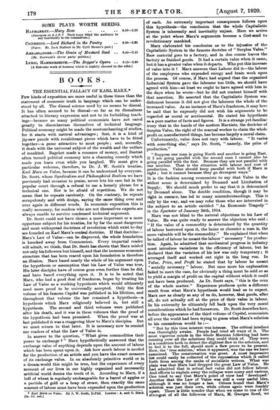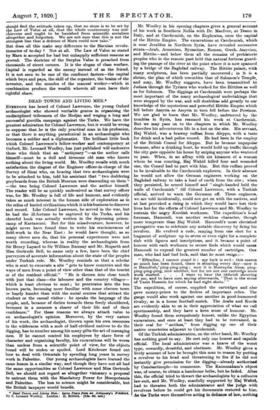BOOKS.
THE ESSENTIAL FALLACY OF KARL MARX.*
FEW kinds of exposition are more useful in these times than the statement of economic truth in language which can be under- stood by all. The dismal science need by no means be dismal. It has often seemed to be dismal—so far as its dismalness attached to literary expression and not to its forbidding teach- ings—because so many political economists have not cared greatly to disembarrass themselves of technical language. Political economy might be made the most enchanting of studies, for it starts with natural advantages ; first, it is a kind of jig-saw puzzle with recalcitrant pieces which have to be fitted together—a game attractive to most people ; and, secondly, it deals with the universal subject of the wealth and the welfare of mankind. Bagehot made a romance of money, and Bastiat often turned political economy into a charming comedy which made you learn even while you laughed. We must give a particular welcome, therefore, to Dr. J. W. Scott's treatise, Karl Marx on Value, because it can be understood by everyone. Dr. Scott, whose Syndicalism and Philosophical Realism we have previously had occasion to praise, never lets his case fail in the popular court through a refusal to use a homely phrase for a technical one. Nor is he afraid of repetition. We do not mean that he repeats carelessly. On the contrary, he repeats scrupulously and with design, wiping the same thing over and over again in different words. In economic exposition this is really necessary, for readers who are not themselves experts are always unable to survive condensed technical argument.
Dr. Scott could not have chosen a more important or a more opportune subject for his treatise, for by far the most dangerous and most widespread doctrines of revolution which exist to-day are founded on Karl Marx's central doctrine. If that doctrine— Marx's Law of Value—can be disproved, the whole foundation is knocked away from Communism. Every impartial reader will admit, we think, that Dr. Scott has shown that Marx misled not only his followers but himself, and that the immense economic structure that has been reared upon his foundation is therefore an illusion. Marx based nearly the whole of his argument upon the hypothesis or assumption that his Law of Value was true. His later disciples have of course gone even further than he did, and have based everything upon it. It is to be noted that Marx, who had a good deal of frankness, began by treating his Law of Value as a working hypothesis which would ultimately need more proof to be universally accepted. Only the first volume of his famous Capital was published in his lifetime, and throughout that volume the law remained a hypothesis—a hypothesis which Marx religiously believed in, but still a hypothesis. The second and third volumes were published after his death, and it was in these volumes that the proof of the hypothesis had been promised. When the proof was at last published it was a staggering blow to Marx's disciples. But we must return to that later. It is necessary now to remind our readers of what the Law of Value is.
In answer to the question, "What gives commodities their power to exchange ? " Marx hypothetically answered that the exchange value of anything depends upon the amount of labour which has been spent upon it. Ask how much labour is needed for the production of an article and you have the exact measure of its exchange value. In an absolutely primitive world or in a dream-world this might be true, but the experience of every moment of our lives in our highly organized and necessarily artificial world denies the truth of it. According to Marx, if a boll of wheat is regularly exchangeable for a barrel of apples or a particle of gold or a heap of straw, then exactly the same amount of labour must have been expended upon the production • Karl Mars on Value. By 5. W. Scott, D.Phil. London : A. and 0. Black. [Ss. Gd. net.]
of each. An extremely important consequence follows upon this hypothesis—the conclusion that the whole Capitalistic System is inherently and inevitably unjust. Here we arrive at the point where Marx's arguments become a God-send to revolutionary mankind.
Marx elaborated his conclusion as to the injuskice of the Capitalistic System in the famous doctrine of "Surplus Value."
Raw material goes to a factory, and in due course leaves the factory as finished goods. It had a certain value when it came, but it has a greater value when it departs. Who put this increase of value into it ? Marx answers that Labour did it--the labour of the employees who expended energy and brain work upon the process. Of course, if Marx had argued that the organized Industrial System gave the labourer too little, we should have agreed with him—at least we ought to have agreed with him in the days when he wrote—but he did not content himself with that assertion. He asserted that the Capitalistic System was dishonest because it did not give the labourer the whole of the increased value. As an instance of Marx's frankness, it may here be said that he expressly did not wish his arguments to be regarded as moral or sentimental. He stated his hypothesis as a pure matter of facts and figures. It is a strange yet familiar irony that in the hands of the modern Marxists, the doctrine of Surplus Value, the right of the manual worker to claim the whole profit on manufactured things, has become largely a moral claim. Unfortunately, value does not vary with labour. "It varies with something else," says Dr. Scott, "namely, the price of production."
"Suppose one man is going North and another is going East. If I am going parallel with the second man I cannot also be going parallel with the first. Because they are not parallel with one another. That is the situation with labour and cost of production. Value should keep parallel with both if Marx is right ; but it cannot because they go divergent ways."
It is the fashion among economists to say that Value in the widest sense is determined by Demand and Limitation of Supply. We should much prefer to say that it is determined by Demand alone. The double condition, though it may be
right in essence, has led to many misunderstandings. This is only by the way, and we may refer those who are interested in
the subject to an article entitled "An Economic Tragedy" in the Spectator of January 24th, 1914.
Marx was not blind to the natural objections to his Law of Value. He was quite ready to answer the objectors who said : "If the value of a commodity is determined by the quantity of labour bestowed upon it, the lazier or clumsier a man is, the more valuable will be the commodity." He explained that when he talked of labour he meant the labour "necessary "for produc- tion. Again, he admitted that mechanical progress in industry must introduce variations in the efficiency of labour, but he declared that the variation of his law was only temporary ; it averaged itself and worked out right in the long run. In Value, Price, and Profit he stated that by labour he meant "socially necessary" labour. But once more his explanation failed to meet the case, for obviously a thing must be sold so as to yield a margin of profit on the capital without which it could not have been produced. As Dr. Scott says, "this is the crux of the whole matter." Experience produces quite a different result from what Marx's hypothesis would lead us to expect. Marx saw as clearly as any of us do, however, that goods, after all, do not actually sell at the price of their value in labour. In his extremity he ultimately fell back upon the very moral considerations which he had foresworn. Dr. Scott describes how, before the appearance of the third volume of Capital, economists all over the world had been trying to guess what Marx's solution to his conundrum would be :—
"But by this time interest was intense. The critical intellect was thoroughly awake. People had tried all ways of it. The most vigorous minds in the whole Marxian following had been running over all the solutions they could think of. They were in a condition both to detect the slightest flaw in the solution, and to feel it to the full, should such a flaw prove to be present. Now, the true solution,' when it appeared, was the one we have examined. The consternation was great. A most impressive list could easily be collected of the expressions which it called forth from among the ranks of socialistic writers. What was plain was that Marx had dropped the great Law of Value. He had admitted that in actual fact value did not follow labour. And efforts to explain away the collapse were many and various. One tried to say that Marx's point of view had developed.' Another that the Law of Value was still a very (useful idea, although it was no longer a law. Others found that Marx's solution was just their own, while others again were frankly upset. There is little wonder that when we come to one of the strongest of all the followers of Marx, M. Georges Sorel, we
should find the attitude taken up, that no store is to be set by the Law of Value at all, that the whole controversy was mis- chievous and ought to be banished from scientific socialism altogether and forgotten. We are ncit sure that this is not the strongest line that a defence of Marx could now take."
But does all this make any difference to the Marxian revolu- tionaries of to-day ? Not at all. The Law of Value as stated by Marx is accepted for bad but unhappily sufficient reasons as proved. The doctrine of the Surplus Value is preached from thousands of street corners. It is the slogan of class warfare. Capital is regarded as the enemy instead of as the friend.
It is not seen to be one of the confluent factors—the capital which buys and pays, the skill of the organizer, the brains of the inventor, and the muscles of the manual worker—which in combination produce the wealth wherein all men have their rightful share.



































 Previous page
Previous page